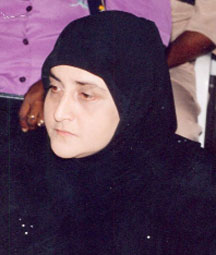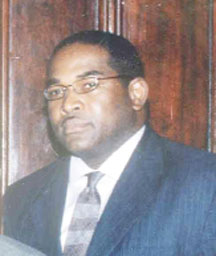-first conviction under new law
A former Guyana Revenue Authority (GRA) employee was yesterday found guilty of money laundering and sentenced to seven years in prison by Magistrate Hazel Octive-Hamilton, becoming the first person convicted under the new law.

Michelle Fraser, who was also the first charged since the new law was enacted a decade ago, was also fined $250,000 by the magistrate yesterday morning. Her lawyer, Nigel Hughes, has since filed an appeal against the conviction, saying he was puzzled by the decision since the evidence suggested otherwise.
The case, which was kept under wraps, was prosecuted by Director of Public Prosecution (DPP) Shalimar Ali-Hack, and it saw international cooperation from intertional law enforcement officers. Two police officers from Scotland Yard were among the nine witnesses who testified at the trial. The case arose out of the huge investigation that was mounted in the UK and other neighbouring countries into the drug running gang labelled the ‘Bling Bling’ gang, which saw several persons-most of them Guyanese-being convicted in the UK in 2006.
Ali-Hack is the only DPP to institute a money laundering charge since the legislation came into force.

In a statement released last evening, Ali-Hack said the prosecution case was that Fraser laundered the cash, knowing it to be the proceeds of crime. According to the prosecution’s case, Fraser went to an unknown woman at an unknown address and collected US$289,000, which she took to Laparkan Financial Services and exchanged it to Guyana currency. At Laparkan, she requested that the money be delivered in three parts; one cheque for $16.9M in the name of “Adrie Callender-Martin”; a cheque for $38M in the name of “Lisa Witter” also known as “Lisa Bennett”; and $578,000 in cash. (Callender-Martin and Witter were both pleaded guilty in the UK to narocitic offences.)
Upon receipt of the cheques and cash, Fraser took the cheques to the New Building Society (NBS) and deposited them into the accounts of Callender-Martin and Witter. The DPP said in doing so, Fraser was engaging in a transaction involving an extremely large quantity of US money. “The circumstances themselves give rise to suspicion, that is, that she cannot identify the woman or the address where she collected this large quantity of money; as well as, the large quantity of money she was handling,” the DPP ex-plained.
Further, she said that two persons in whose names the cheques were written were both convicted in England for the offence of trafficking in cocaine.
‘Never under investigation’
Hughes yesterday told Stabroek News what “interestingly” came out during the case was that the two visiting UK police officers both said his client was never under any investigation in the UK, in relation to any money laundering charges. He said that the two officers who visited these shores to testify were Detective Constables Paul Allen and Robert Lister.
According to him, under cross examination Detective Allen said: “On the 16 of December 2004, when I went to speak to her [Fraser] I had no reasonably grounds for suspecting that she was involved in any criminal offence and she did not know the origin of the money.”
He said Constable Lister also said he did not consider Fraser to be a person involved in the criminal enterprise he was invetsigating. Hughes said the other witnesses called by the prosecution were staff from NBS and local police officers.
His client’s defence in court was that she had an account with NBS for years and that sometime in 2004 she saw her childhood friend Callender-Martin, who told her that she was “doing well” in neighbouring French Guiana and that she wanted to build a house in Guyana. The lawyer said his client later went to that country, where she saw her friend operating a thriving sports store.
Later, Callender-Martin reportedly told Fraser that she wanted to open an account at NBS but the institution refused to allow her to do so and she requested that Fraser make her a joint partner in her existing account. This was done and later the US$280,000 was changed at Laparkan and the cheques were made out to the two women and deposited by Fraser. It was shortly after the monies were deposited-in December 2004-that officers from Scotland Yard visited Guyana and questioned Fraser and she told them that she knew Callender-Martin since childhood. A restraining order was then served and it prevented her from touching the money.
Under the money laundering law, prosecution requires the fiat of the DPP before any charge can be instituted. She said since the enactment of the Money Laundering Act in 2000, referred to as the “old” law, applications have been initiated by the DPP to have the “proceeds of crime” forfeited or in some instances, a freezing of the assets. Once the orders are granted, the Minister of Legal Affairs directs the manner of disposal in accordance with section 20 of the Money Laundering (Prevention) Act 2000.
Proceeds of Crime
The DPP said during the course of the investigations by the Metropolitan police in the UK based on comity and mutual assistance treaties, orders made in the United Kingdom in relation to persons charged there for drug-smuggling and money laundering, were validated by the Guyana High Court and as a result of the information received, the proceeds of crime were traced and frozen based on applications made by the DPP. One of the assets was account # 161 683 8 at the Republic Bank, into which $38M was deposited by Fraser.
The DPP had obtained Freezing Orders for that account but despite this Confiscation Order an ex-parte application dated September 3, 2008 was made to the High Court by Hughes on behalf of Cymone Witter, who is the sister of Lisa Witter for access to and permission to withdraw account from the bank. “Justice Brassington Reynolds without hearing the DPP, who had applied for the Freezing Order, made the matter inter partes with Republic Bank and granted the application for access to and permission to withdraw account # 161 683 8 at the Republic bank,” the DPP said. The DPP added that investigations are ongoing in relation to tracing the money withdrawn from that account and a substantial amount of the said money has been traced so far.
The DPP said upon convictions of the two women in the case, applications were made for forfeiture and confiscation of the assets in the two accounts and the accounts which are in the name of Lisa Bennett were forfeited and confiscated by the Chief Justice. “Since then the DPP is in the process of moving against other assets and bank accounts and these other matters are engaging the attention of the court,” Ali-Hack said. She added: “In determining whether or not any property is derived from or connected or related to a money laundering offence, the court shall apply the standard of proof required in civil proceedings.”
Fraser was charged in 2005 and the case was heard by former Magistrate Bertlyn Reynolds. But the magistrate demitted office before the cases was concluded and it had to be done de novo. This resulted in the entire case being tried again before Magistrate Octive-Hamilton.
‘Bling Bling’ gang
Police in the UK had said the group of people–dubbed the “Bling Bling” gang because of their high-living lifestyles–made up one of the biggest drug rackets ever brought to justice in that country. The gang, whose members were mostly of Guyanese and Caribbean descent, had bases in London, Paris and New York. They made huge profits. Police had said that the British contingent, mainly foreigners whose legal immigration status had lapsed, had smuggled about £50 million worth of cocaine into the UK in just two years. The gang turned the cocaine into crack, a highly addictive form that could have been sold for as much as six times its unaltered value.
Bennett was the partner of Bernard ‘Kofi’ Clarke, 31 who was described as a “principal player” in the gang and was jailed for 18 years and recommended for deportation after pleading guilty to importing cocaine and manufacturing and supplying crack. Bennett, 39, was also sentenced to 18 years imprisonment and recommended for deportation. The court had heard that Clarke and Bennett had acted as the “cooks” to produce the crack.
Guyanese Ian ‘Bowfoot’ Dundas-Jones was said to be the principal person in the Bling Bling Gang.
Guyanese Roger Khan, David Narine, David Clarke and Peter Morgan, who have all pleaded guilty to drug charges in the US, operated here but none of them was charged locally with any type of money laundering or drug offence.
While commending the authorities for making the move, observers have pointed out that the ‘Bling Bling’ gang members did not operate out of Guyana yet the authorities found enough evidence to move to the local courts. Observers further pointed out that Khan, Morgan and others did operate in Guyana and to date no charge under the new money laundering law had been brought against them.





